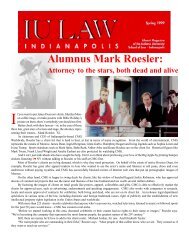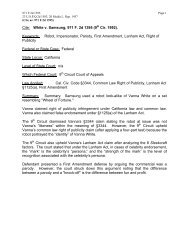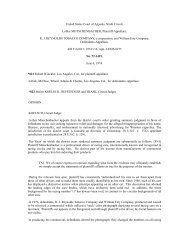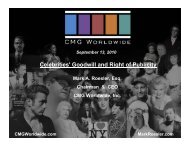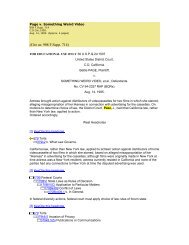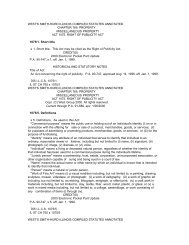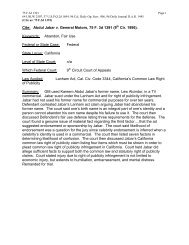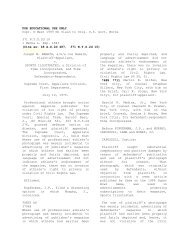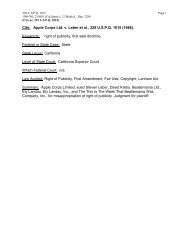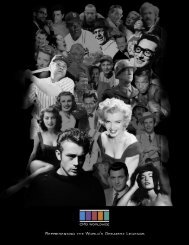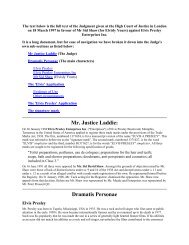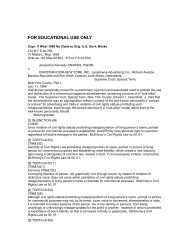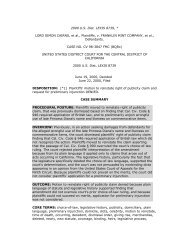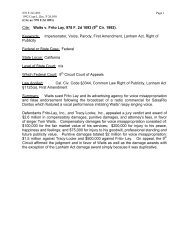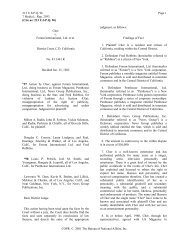Hustler v. Falwell.pdf - Mark Roesler
Hustler v. Falwell.pdf - Mark Roesler
Hustler v. Falwell.pdf - Mark Roesler
Create successful ePaper yourself
Turn your PDF publications into a flip-book with our unique Google optimized e-Paper software.
840 F.2d 691, 693 (9th Cir. 1988) (observing that dismissal "for failure to<br />
state a claim upon which relief could be granted" is reviewed de novo, without<br />
mentioning Rule 12(b)(6)).<br />
II<br />
The district court granted summary judgment on Dworkin's libel claims on<br />
two<br />
independent grounds. First, the court found that the Features could not<br />
reasonably be understood as expressing statements of fact about Dworkin,<br />
[**9] and therefore could not provide a basis for defamation liability.<br />
Second, the court found that even if the Features did contain false statements<br />
of fact, Dworkin had presented no evidence of malice as required by New York<br />
Times v. Sullivan, 376 U.S. 254, 11 L. Ed. 2d 686, 84 S. Ct. 710 [*1193]<br />
(1964) ("New York Times malice"), and therefore had failed to establish a<br />
genuine issue of material fact with respect to an issue on which she bore the<br />
burden of proof. If upheld, either of these conclusions would also dispose of<br />
Dworkin's intentional infliction of emotional distress n2 and false light<br />
privacy n3 claims.<br />
- - - - - - - - - - - - - - - - - -Footnotes- - - - - - - - - - - - - - - - - -<br />
n2 Leidholdt, 860 F.2d at 893; Ault, 860 F.2d at 880; see <strong>Falwell</strong>, 108 S. Ct.<br />
at 882. the district court, which rendered its decision before the Supreme Court<br />
handed down <strong>Falwell</strong>, properly granted summary judgment on Dworkin's<br />
emotional<br />
distress claims on a different ground. The district court reasoned, "whatever<br />
the label, Dworkin cannot maintain a separate cause of action for mental and<br />
emotional distress where the gravamen is defamation." Dworkin, 668 F. Supp. at<br />
1420. As we recently noted, "an emotional distress claim based on the same<br />
facts<br />
as an unsuccessful libel claim cannot survive as an independent cause of<br />
action." Leidholdt, 860 F.2d at 893 n. 4.<br />
Although the complaint sets forth separate counts for emotional distress and<br />
outrage, appellants have not differentiated these claims before us or the<br />
district court. The district court correctly held that these counts assert the<br />
same claim. "The tort of outrage is not spearable from intentional infliction of<br />
emotional distress." Id. at 892 n.2. [**10]<br />
n3 Leidholt, 860 F.2d at 893; Ault, 860 F.2d at 880; see Time, Inc. v. Hill,<br />
385 U.S. 374, 390, 394, 17 L. Ed. 2d 456, 87 S. Ct. 534 (1967). Furthermore, as<br />
with the emotional distress claim. Dworkin's false light privacy claim is<br />
"sufficiently duplicative of libel" as to be subsumed within it. Leidholdt, 860<br />
F.2d at 893 n.4. In order to survive as a separate cause of action, a false<br />
PAGE 14<br />
867 F.2d 1188, *1193; 1989 U.S. App. LEXIS 565, **10;<br />
16 Media L. Rep. 1113<br />
light claim must allege a nondefamatory statement. If the statements alleged are<br />
defamatory, the claim would be for defamation only, not false light privacy. See<br />
Time, 385 U.S. at 390-91. In this case, Dworkin has strenuously argued that<br />
<strong>Hustler</strong>'s statements are defamatory. Consequently, she has failed to state a<br />
false light claim; the false light aspects of her privacy claim are subsumed in<br />
her libel claims.



